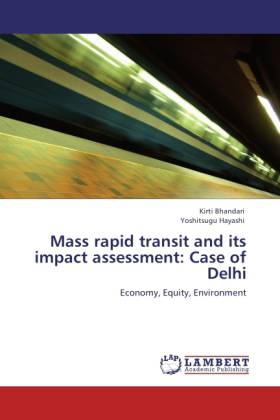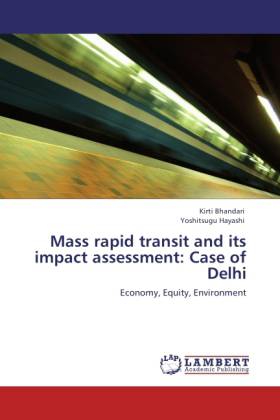
- Afhalen na 1 uur in een winkel met voorraad
- Gratis thuislevering in België vanaf € 30
- Ruim aanbod met 7 miljoen producten
- Afhalen na 1 uur in een winkel met voorraad
- Gratis thuislevering in België vanaf € 30
- Ruim aanbod met 7 miljoen producten
Zoeken
Mass rapid transit and its impact assessment: Case of Delhi
Economy, Equity, Environment
Kirti Bhandari, Yoshitsugu Hayashi
Paperback | Engels
€ 79,45
+ 158 punten
Omschrijving
Rapidly increasing motorization has environmental consequenses. In this light the Government of India has announced a national urban transport policy in April 2006 as an integral part of the Jawaharlal Nehru National Urban Renewal Mission (JNNURM). The draft National Urban Transport Policy (NUTP) aims at curtailing the use of private vehicles and give impetus to public transport and non-motorized vehicles.The options for this include buses on dedicated corridors, elevated sky bus and monorail systems, electric trolley buses and metro systems. The present study focuses on metro systems and analyses the economic, equity and environmental impacts of metro systems in developing countries, taking Delhi as an example. This work is PhD thesis submitted at the Laboratory of Sustainable Transport & Spatial Development, Graduate School of Environmental Studies,Nagoya University,Japan, 2009.
Specificaties
Betrokkenen
- Auteur(s):
- Uitgeverij:
Inhoud
- Aantal bladzijden:
- 152
- Taal:
- Engels
Eigenschappen
- Productcode (EAN):
- 9783846511558
- Verschijningsdatum:
- 30/09/2011
- Uitvoering:
- Paperback
- Afmetingen:
- 152 mm x 229 mm
- Gewicht:
- 231 g

Alleen bij Standaard Boekhandel
+ 158 punten op je klantenkaart van Standaard Boekhandel
Beoordelingen
We publiceren alleen reviews die voldoen aan de voorwaarden voor reviews. Bekijk onze voorwaarden voor reviews.







